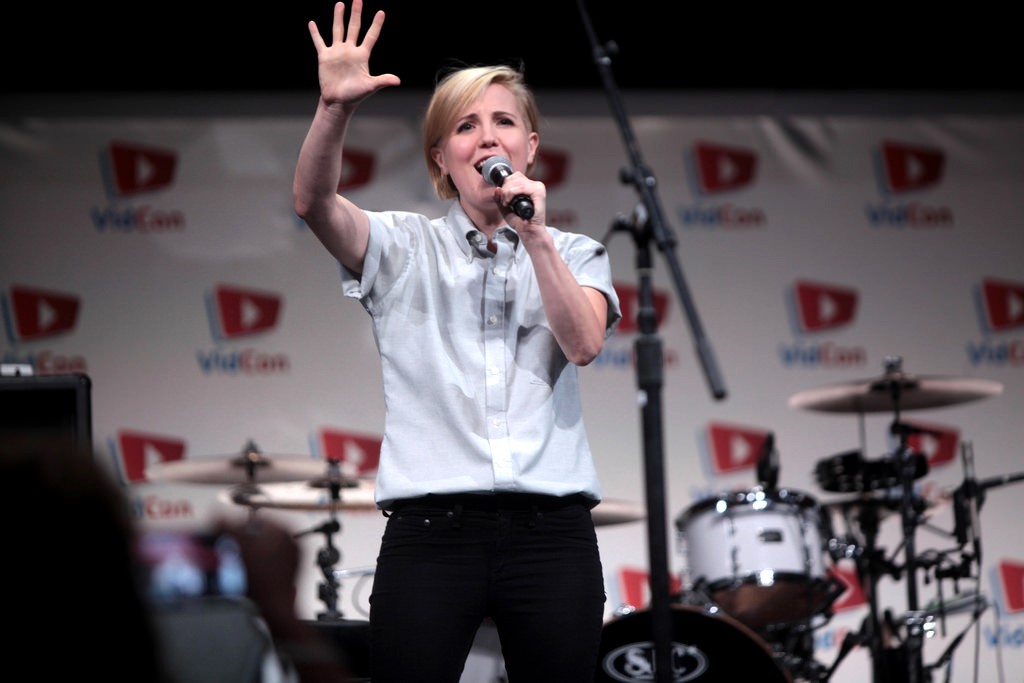
In Buffering: Unshared Tales of a Life Fully Loaded, YouTuber Hannah Hart shares deeply personal and emotional stories of her broken childhood. Her stories not only tear at one’s heart strings, but serve as comfort for others going through similar experiences.
Hart initially started her career on YouTube, where she hosts “My Drunk Kitchen.” In the show, she cooks various items at varying degrees of intoxication. Hart amassed over 2.5 million subscribers over her five years of being an internet personality. In 2014, she released My Drunk Kitchen: a guide to eating, drinking, and going with your gut, a parody cookbook. She also starred in two comedy movies, Camp Takota (2014) and Dirty Thirty (2016.)
Fear underlies the stories of this book, a stark contrast to her light-hearted and silly internet videos. Hart describes her childhood filled with Child Protection Services visits and inhabitable homes. She includes stories of her schizophrenic mother, her Jehovah’s witness father and the painful realization of her homosexuality.
“It’s hard for me to revisit all the fear and judgement I held in my heart,” Hart said. “All the loss I felt coming to terms with my sexuality. The lost of my faith, the loss of my father, the the loss of so many things just to have this small, insignificant thing. Ya Know. Falling in love and finding a partner and living an honest and wholesome life. No big deal.”
Nevertheless, Hart does not forget to mention the parts of her stories that display happy memories. She describes how the terrible situations she lived through made her a stronger and loving person today. Hart does not hesitate to detail the positive memories from her broken childhood. Memories like playing endless games with her older sister, Naomi, raising her younger sister, Maggie, and her initial interest in comedy help lessen the pain of her trauma. She explains that, though her father disowned her for being homosexual, she has found acceptance within herself.
Buffering also includes excerpts from Hart’s journals she kept while experiencing the parts of her life described in the book. These entries provide more depth and emotion to her writing.
Alongside storytelling, Hart brings attention to a topic close to her heart, the Lanterman–Petris–Short Act. LPS concerns family members seeking guardianship over their mentally-ill loved one. Her mother’s schizophrenia causes delusions, and she did not think she had a mental illness. Because of this, it was extremely hard to get the medical help she needed.
When Hart tried to make important health decisions on her mother’s behalf, she was denied by the hospitals until she received an LPS conservatorship, a legal document that allows a guardian to manage the life of someone with mental disabilities. She states she received the conservatorship because of her fame and color of her skin. She explains how those in her same situation will not have the same results if they do not have the same privileges as her. She aspires to pass amendments to these laws that allow people to help their loved ones receive the care they need.
“Still, with all these resources, I almost lost my mother and could still potentially lose her,” Hart said. “If a white, wealthy, educated, famous person can’t save her parents from the street- who can? Who does this system work for? The system works for itself.”
Though Hart’s journey is an emotional rollercoaster, she words it and explains it so well and so positively. Her memoir gives hope to those in similar situation to hers. In every bad story, she shines a light on how the situation led her to a happier and more self-fulfilled life and it made her better, not bitter.
Author: Hannah Hart
Genre: Memoir
Publisher: Dey St. William Morrow
Number of Pages: 256
Cost: $23.99
Rating: 4.5 of 5
